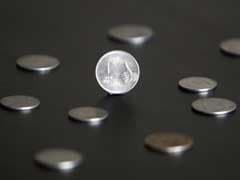
Rupee opened flat at 75.67 against US dollar on Wednesday
The rupee on Wednesday morning, slipped 8 paise to 75.74 against the US dollar after opening at almost the same level, as the previous closing mark. In the morning, the domestic currency opened at 75.67, a mere 0.01 paise weaker than Tuesday's closing of 75.66. Forex traders told news agency PTI that rupee was trading in a narrow range as rising optimism about a potential coronavirus vaccine and a revival in business activity was offset by the escalation of US-China tension. Moreover, strengthening of the American currency overseas and muted opening of domestic equities also weighed on the local unit.
"Asian currencies were weak this Wednesday morning amid escalation of tension between the US and China. Offshore yuan was weak by 0.3 per cent and Korean won also weak by 0.3 per cent," Reliance Securities said in a research note.
In the last session, rupee witnessed a healthy recovery of 29 paise against the greenback as the easing of COVID-19 lockdown measures fuelled growth optimism.
Meanwhile, the domestic equity market turned flat after opening on a positive note on Wednesday. The S&P BSE Sensex index opened 183.81 points higher at 30,793.11, and the broader NSE Nifty 50 benchmark started the day at 9,082.20, up 53.15 points compared to its previous close. However, at 10:26 am, the 30-share index was merely 10 points, while the broader 50-share index was 18 points in the green.
Foreign institutional investors were net buyers in the capital market, as they bought equity shares worth Rs 4,716.13 crore on Tuesday, according to provisional exchange data. Brent crude futures, the global oil benchmark, fell 0.22 per cent to $36.09 per barrel. The dollar index, which gauges the greenback''s strength against a basket of six currencies, rose by 0.25 per cent to 99.15.
Overnight in the US, shares jumped with the S&P 500 benchmark index touching the 3,000 mark for the first time, as optimism about a potential coronavirus vaccine and a revival in business activity helped investors overlook simmering US-China tensions.






